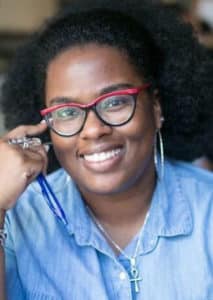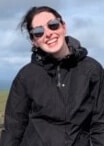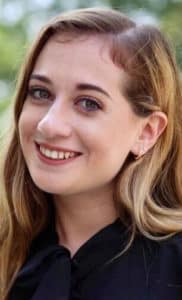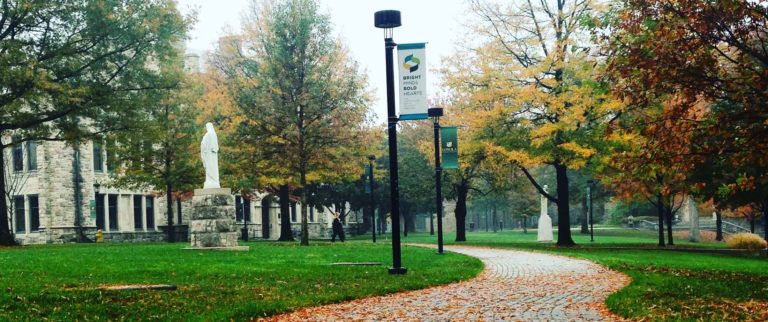With eight Fulbright Scholarship recipients for 2019, Loyola University Maryland has doubled its previous record for the prestigious awards.
Established in 1946 under legislation introduced by a U.S. Senator from Arkansas, the Fulbright Program awards approximately 1,600 scholarships to U.S. students annually. It is administered by the State Department’s Bureau of Cultural and Educational Affairs.
Maiju Lehmijoki-Gardner is director of national fellowships for the liberal arts school in north Baltimore. She said that graduating seniors, alumni and candidates for advanced degrees who vie to teach or conduct research abroad benefit simply by applying.
“It creates a process through which the students ask themselves, ‘Who am I, and where am I going?’ ” explained Lehmijoki-Gardner, who also serves as director of pre-health programs and teaches theology at the Jesuit-sponsored Catholic school.
“It sets up a process,” she continued, “for them to ask, ‘How can I serve my community, professionally speaking, in the best way?’ ”
The Review spoke with three of Loyola’s 2019 Fulbright scholars. All attended Catholic high schools, two in the Archdiocese of Baltimore.
Carla Blackwell
 Her background shaped by Baltimore City’s public and Catholic institutions, Carla Blackwell hopes to challenge and be challenged by her students in South Africa.
Her background shaped by Baltimore City’s public and Catholic institutions, Carla Blackwell hopes to challenge and be challenged by her students in South Africa.
“I will give them a black woman’s point of view on the U.S.,” said Blackwell, who earned a master’s degree in education from Loyola in 2016.
“At the same time, I’m also there to learn. I want to leave with a broader and deeper perspective, as well as some new language skills,” she added, noting that South Africa has 11 national languages.
Baptized at St. Francis Xavier in Baltimore, where her father is still a parishioner, Blackwell attended the School of the Cathedral of Mary Our Queen in Homeland and the Institute of Notre Dame.
Her early grammar school years at what was then Grace and St. Peter’s School, attached to the Episcopal church of the same name in Mount Vernon, helped her fall in love with the written word.
“We would walk to the Enoch Pratt main branch,” she said.
An only child, Blackwell spent countless hours alone with a book in the nook between her bed and bookshelf, and eventually decided to become a reading specialist.
“Loyola’s program was the best!” she said.
She will help college students at the University of Pretoria learn English from January to October of 2020. Having taught English for nine years in Baltimore City Public Schools, she brings experience as well as enthusiasm to the job.
Blackwell credits her professors and mentors at Loyola – especially Leah Saal, assistant professor of literacy education and co-director of the literacy education department – with helping her find her path.
“They didn’t come across as ‘so much higher,’ but as individuals with a wealth of knowledge to elevate us students,” Blackwell said. “We were treated as ‘budding experts.’”
Keenan Gibbons
 A native of Buffalo, N.Y., Keenan Gibbons is engaged in intense study, in Germany, of a 19th-century German who played a critical role in the development of the public health field.
A native of Buffalo, N.Y., Keenan Gibbons is engaged in intense study, in Germany, of a 19th-century German who played a critical role in the development of the public health field.
“It’s not truly a day until you’ve dissected someone,” Rudolf Virchow once said, according to Gibbons, who has been researching secondary sources in the original German.
Virchow channeled his combination of audacity and curiosity into – among many other things – what is likely the first museum dedicated to medicine; it housed the fruits of his aforementioned pastime.
“He made the museum partially for teaching and partially for science,” Gibbons said. “Of interest to me is that he opened it to the public. As someone studying public health – particularly in the 19th and 20th centuries – that’s kind of huge.
Gibbons, a 2019 Loyola graduate, notes that her host organization in Germany, the Charité-Universitätsmediz in Berlin, a prestigious university hospital, has a parallel in Baltimore’s Johns Hopkins School of Medicine. Like the Charité’s Berlin Museum of Medical History, Hopkins’ William H. Welch Memorial Library tracks the development of modern medicine and the trajectory of public health.
In fact, Welch, who factored heavily into Gibbons’ senior thesis, intended to study under Virchow; he managed to study under Virchow’s students. Credited as one of the “Big Four” founders of Johns Hopkins, Welch also founded what is now the Johns Hopkins Bloomberg School of Public Health.
Gibbons’ interest and attendant research seem complicated; her other love is rowing. Gibbons rowed in both high school and college, even coaching crew at Mount St. Mary Academy in Buffalo, her alma mater.
She ascribes both pursuits to a common motivator.
The question “How do you serve others?” Gibbons said, was posed to her repeatedly, both at Loyola and the prior Catholic schools she attended.
With regard to crew, the answer was sharing her sport through service projects, “bringing the sport to communities that didn’t normally get to do that.”
For public health, her path is more or less clear: “The main thing I’m interested in is healthcare policy and education,” she said. “How do you bring it to communities?”
Allie Weis
 “Bruges reminds me of New York City a little bit,” said Allie Weis, who began teaching at the Hogeschool West-Vlaanderen, a university with campuses in the Belgian cities of Bruges and Kortrijk, in September.
“Bruges reminds me of New York City a little bit,” said Allie Weis, who began teaching at the Hogeschool West-Vlaanderen, a university with campuses in the Belgian cities of Bruges and Kortrijk, in September.
In her Bruges classroom, refugees and migrants share their stories with students studying social work.
“Hearing their stories is really impactful, and it’s something I’ll be taking with me,” Weis said. “They have a lot of questions about politics in the U.S., which I gladly answer. We learn from each other.”
Before Loyola, Weis was raised at St. Joseph in Cockeysville, and attended Maryvale Preparatory School in Lutherville from grade 6 on.
She developed her interest in serving refugees via her experience at Catholic Relief Services. Weis twice interned for the Baltimore-based organization. In 2017, she worked in CRS’ human resources department; in 2018, she assisted with its global giving program.
“I met immigrants from the Middle East, Africa, and Asia,” Weis said. “We had a lot of people come in from the field and talk about what they were doing in education and public health. It inspired me so much.”
In addition to her work with aspiring social workers in Bruges, she is helping her students in Kortrijk, about one hour to the south, with American culture and the nuances of English.
“I coach and offer grammatical assistance for students looking to start their own businesses,” Weis explained. “It’s not my background, but I’ve found it very interesting.”
Her love for teaching was also kindled at Loyola. She tutored students at Turnbridge Public Charter School and Walter P. Carter Elementary/Middle School, both in Baltimore.
She also studied abroad in Louvain, Belgium, working with secondary school students there.
“I realized teaching is something I really have a passion for,” said Weis, who majored in psychology with a minor in philosophy. “It’s letting students know I care about them both inside and outside the classroom.”



